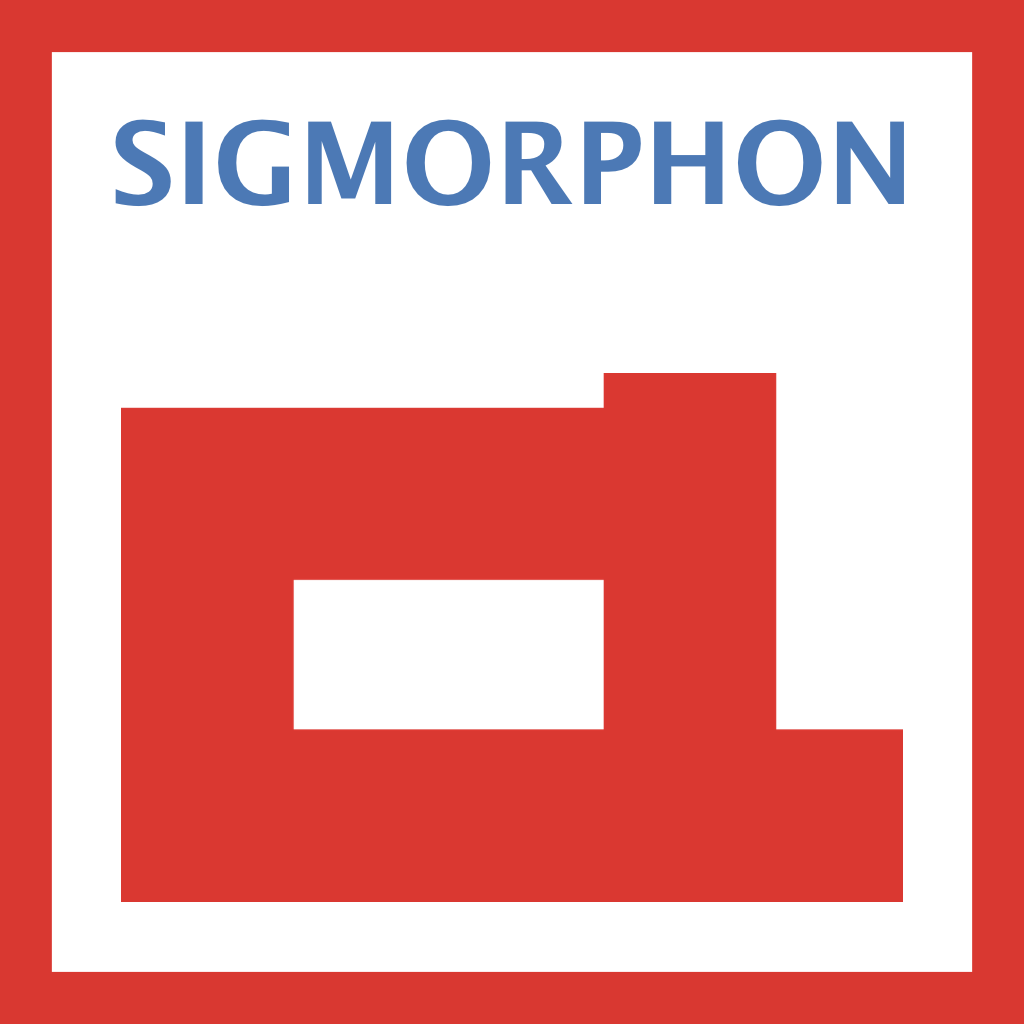co-located with ACL 2019
Florence, Italy
SIGMORPHON aims to bring together researchers interested in applying computational techniques to problems in morphology, phonology, and phonetics. Work that addresses orthographic issues is also welcome. Papers will be on substantial, original, and unpublished research on these topics, potentially including strong work in progress. Appropriate topics include (but are not limited to) the following as they relate to the areas of the workshop:
- New formalisms, computational treatments, or probabilistic models of existing linguistic formalisms
- Unsupervised, semi-supervised, or machine learning of linguistic knowledge
- Analysis or exploitation of multilingual, multi-dialectal, or diachronic data
- Integration of morphology, phonology, or phonetics with other NLP tasks
- Algorithms for string analysis and manipulation, including finite-state methods
- Models of psycholinguistic experiments
- Approaches to orthographic variation
- Approaches to morphological reinflection
- Corpus linguistics
- Machine transliteration and back-transliteration
- Morpheme identification and word segmentation
- Speech technologies relating to phonetics or phonology
- Speech science (both production and comprehension)
- Instructional technologies for second-language learners
- Tools and resources
SIGMORPHON encourages interaction between work in computational linguistics and work in theoretical phonetics, phonology and morphology, and to ensure that each of these fields profits from the interaction. Our recent meetings have been successful in this regard, and we hope to see this continue in 2019.
Many mainstream linguists studying phonetics, phonology and morphology are employing computational tools and models that are of considerable interest to computational linguists. Similarly, models and tools developed by and for computational linguists may be of interest to theoretical linguists working in these areas. This workshop provides a forum for these researchers to interact and become exposed to each others’ ideas and research.
Titles and abstracts available here.
Important Dates
15 April 22 April, 2019: Paper submission deadline
15 May, 2019: Notification of Acceptance
29 May 3 June, 2019: Camera-ready deadline
2 August, 2019: Workshop
Paper submission
Online submission is available at: https://www.softconf.com/acl2019/sigmorphon/
Content
Long papers should be original, topical, and clear. Completed work is preferable to intended work. Either way, the paper must disclose the state of completion of the reported results. We also encourage short submissions. These can either cover research or describe important problems (new or old).
Submission format
The only accepted format for submitted papers is Adobe PDF. Submissions should be anonymous, without authors or an acknowledgement section; self-citations should appear in third person. Submissions should follow the two-column format of ACL proceedings, and long papers should not exceed eight (8) pages, short papers should not exceed four (4) pages. Unlimited additional pages are allowed for the references section in both cases. However, all material other than the bibliography must fall within the first 8/4 pages! We encourage the submission of supplemental material such as data and code, as well as appendices; however, supplemental material should not be essential for the understanding of the submission. We strongly recommend the use of the LaTeX style files or Microsoft Word document template on the ACL conference website. We reserve the right to reject submissions that do not conform to these styles, including font size restrictions.
Anonymity period
ACL 2019 adopts ACL’s new policies for submission, review, and citation. Submissions that violate any of these policies will be rejected without review. Most importantly, the policies refer to the anonymity period, which begins one month before the 2019 submission deadline and ends at time of notification (or withdrawal).
Organizers
- Garrett Nicolai, Johns Hopkins University
- Ryan Cotterell, University of Cambridge
Email address: <sigmorphon+workshop2019@gmail.com>
Program Committee
- Noor Abo Mokh, Indiana University
- Jane Chandlee, Haverford College
- Çağrı Çöltekin, University of Tübingen
- Daniel Dakota, Indiana University
- Ewan Dunbar, Université Paris Diderot
- Jason Eisner, Johns Hopkins University
- Micha Elsner, The Ohio State University
- Kyle Gorman, CUNY / Google AI
- Nizar Habash, NYU Abu Dhabi
- Mans Hulden, University of Colorado
- Adam Jardine, Rutgers University
- Gaja Jarosz, University of Massachusetts Amherst
- Christo Kirov, Google AI
- Greg Kobele, Universität Leipzig
- Greg Kondrak, University of Alberta
- Sandra Kübler, Indiana University
- Andrew Lamont, University of Massachusetts Amherst
- Karen Livescu, TTI Chicago
- Arya D. McCarthy, Johns Hopkins University
- Kevin McMullin, University of Ottawa
- Kemal Oflazer, CMU Qatar
- Jeff Parker, Brigham Young University
- Gerald Penn, University of Toronto
- Jelena Prokic, Ludwig-Maximilians-University Munich
- Mohamad Salameh, Diffbot
- Miikka Silfverberg, University of Colorado
- Kairit Sirts, University of Tartu
- Kenneth Steimel, Indiana University
- Francis Tyers, Indiana University
- Anssi Yli-Jyrä, University of Helsinki
- Kristine Yu, University of Massachusetts Amherst
Shared Task
This year, SIGMORPHON is hosting the 4th SIGMORPHON Shared Task, this year with a focus in cross-lingual training and contextual lemmatization and analysis.
For more information, please visit https://sigmorphon.github.io/sharedtasks/2019/
